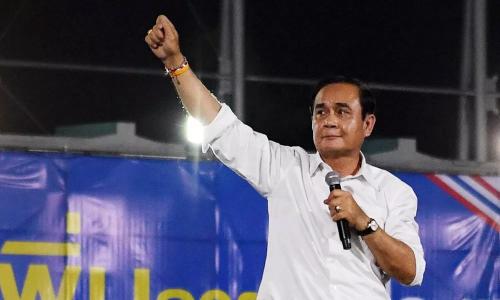Thai election results show no clear winner, but junta party favoured
Long-delayed results of Thailand’s first election since a 2014 military coup released on Wednesday produced no clear winner but gave a pro-army party a clear advantage in its bid to install the current junta leader as an elected prime minister.
The opposition threatened legal action against Wednesday’s results, saying that a new seat allocation formula robbed the “democratic front” alliance of a majority in the 500-seat House of Representatives.
The results are likely to set up a period of coalition building, since neither the pro-military bloc of parties nor a “democratic front” opposition alliance so far has enough votes to elect a prime minister under rules written by the junta.
Any government that emerges is likely to be weak, because even if the junta leader’s party forms the government, it will still have to contend with the possibility of defections with allies in the lower house to pass legislation.
It will still be weeks before any government can be formed while a junta-selected committee finishes appointing the Senate, the 250-seat upper house of parliament that will vote together with the elected House to choose the prime minister.
Still, Wednesday’s results made it more likely that the party of coup leader Prayuth Chan-ocha will stay in power because it needs fewer allies among small and medium-sized parties to get to the 376 votes needed to elect the prime minister in the combined House and Senate vote.
Prayuth’s Palang Pracharat party said it was confident it would lead to the formation of the next government, but didn’t yet name its allies.
“We will coordinate with other parties who share our ideology and are interested in forming a government together,” said its leader, Uttama Savanayana, a former minister under Prayuth’s previous cabinets.
The Pheu Thai party, allied to ousted Prime Minister Thaksin Shinawatra, vowed to “pursue every legal means” to reverse an Election Commission formula it says favored tiny parties at the expense of its own larger vote-getters.
“The Pheu Thai Party sees the Election Commission’s proceedings as deliberate actions and use of power in violations of the constitution and the (electoral) law,” it said in a statement.
The opposition had already complained the post-coup election rules were written to give advantage pro-army parties, because the appointed Senate is likely to vote along with Prayuth’s party. The Election Commission and the junta deny any bias in the electoral law.
Palang Pracharat needs control over only about 126 seats in the House to vote in Prayuth as prime minister, under the assumption it will get most or all of junta-appointed Senate’s 250 votes.
Palang Pracharat won 115 seats in the House, according to Wednesday’s results from the Election Commission. Parties it is allied with won seven seats, bringing it to 122 votes.
That means Palang Pracharat needs only to gain four or more votes from the 16 unaligned parties that won 131 seats combined.
The “democratic front” of seven parties won a combined 245 seats in the House, falling just short of the majority in the 500-seat lower house.
Two seats have not yet been allocated pending re-votes ordered by the Election Commission.
The electoral rules make it practically impossible for the opposition to overcome the Senate’s vote to form a government.
But it had hoped gaining a majority in the lower house would allow it to block the junta from retaining nearly unrestrained power it has wielded since the military takeover five years ago.
- Reuters
RM12.50 / month
- Unlimited access to award-winning journalism
- Comment and share your opinions on all our articles
- Gift interesting stories to your friends
- Tax deductable
